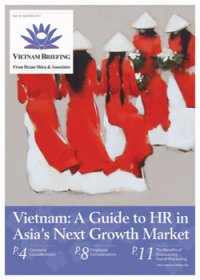Vietnam Footwear Industry Sees Growth Ahead of TPP
HCMC – The upcoming Trans-Pacific Partnership (TPP), a US-led free trade agreement, is expected to have strong positive effects on Vietnam’s footwear industry. Once implemented, the TPP will reduce tariffs on most Vietnamese exports to the US to zero.
Vietnam is one of the ten largest exporters of leather products. In fact, the Vietnam Industry and Trade Information Centre (VITIC) predicts that the country will reach US$12 billion in leather-product exports for 2014. In the first nine months of this year, Vietnam exported US$7.4 billion in footwear (up 24 percent YoY) and US$1.9 billion in handbags (up 37 percent YoY).
 RELATED: Dezan Shira & Associates’ International Tax Planning Services
RELATED: Dezan Shira & Associates’ International Tax Planning Services
In terms of revenue, footwear is Vietnam’s third most productive export industry, generating US$8.5 billion in 2013. Government records show that around 600 businesses are engaged in the footwear industry and are employing over one million workers in direct and supporting sectors. The country produces 800 million pairs of shoes per year.
Footwear is but one of the many products that manufacturers are increasingly exporting from Vietnam. The American Chamber of Commerce (AmCham) predicts that Vietnam will become the largest ASEAN supplier to the United States by the end of 2014 – with a net export value of around US$29.4 billion. Additional statistics indicate that bilateral trade with the United States will surge to US$57 billion by 2020, cementing Vietnam’s prominence as a valuable hub for foreign investment and trade. Collectively, ASEAN represents a market of some 600 million people, with a combined GDP of about US$2.5 trillion and upwards of US$1.5 trillion in trade flowing throughout the region.
RELATED: Economic Growth Puts Vietnam on Track to Become Largest ASEAN Supplier to the U.S.
Additionally, recent trends show that the number of orders shifting from China to Vietnam has seen a significant increase. With its rising costs, China is no longer the go to destination for many manufacturers – Vietnam has arisen as a serious competitor.
Besides the TPP, Vietnam is attractive to footwear manufacturers for a number of reasons, including:
- A stable currency
- Low wages (about 38 percent those paid in China for the same industry)
- Highly skilled workers
- The country’s advantageous location in the ASEAN region and proximity to China
- Additional free trade agreements, such as the Regional Comprehensive Economic Partnership (RCEP), the ASEAN Economic Community (AEC), and the EU-Vietnam FTA
However, local Vietnamese industries still have some catching up to do if they wish to remain competitive after the implementation of the TPP. In particular, the industry will have to develop a better material base and local businesses will need to strengthen their business skills, such as marketing and product development.
Asia Briefing Ltd. is a subsidiary of Dezan Shira & Associates. Dezan Shira is a specialist foreign direct investment practice, providing corporate establishment, business advisory, tax advisory and compliance, accounting, payroll, due diligence and financial review services to multinationals investing in China, Hong Kong, India, Vietnam, Singapore and the rest of ASEAN. For further information, please email vietnam@dezshira.com or visit www.dezshira.com.
Stay up to date with the latest business and investment trends in Asia by subscribing to our complimentary update service featuring news, commentary and regulatory insight.
Related Reading
 Vietnam: A Guide to HR in Asia’s Next Growth Market
Vietnam: A Guide to HR in Asia’s Next Growth Market
In this issue of Vietnam Briefing, we attempt to clarify human resources (HR) and payroll processes in Vietnam. We first take you through the current trends affecting the HR landscape and then we delve into the process of hiring and paying your employees. We next look at what specific obligations an employer has to their employees. Additionally, we guide you through the often complex system of visas, work permits, and temporary residence cards. Finally, we highlight the benefits of outsourcing your payroll to a “pan-Asia” vendor.
 Tax, Accounting, and Audit in Vietnam 2014-2015
Tax, Accounting, and Audit in Vietnam 2014-2015
The first edition of Tax, Accounting, and Audit in Vietnam, published in 2014, offers a comprehensive overview of the major taxes foreign investors are likely to encounter when establishing or operating a business in Vietnam, as well as other tax-relevant obligations. This concise, detailed, yet pragmatic guide is ideal for CFOs, compliance officers and heads of accounting who need to be able to navigate the complex tax and accounting landscape in Vietnam in order to effectively manage and strategically plan their Vietnam operations.
 An Introduction to Doing Business in Vietnam 2014 (Second Edition)
An Introduction to Doing Business in Vietnam 2014 (Second Edition)
An Introduction to Doing Business in Vietnam 2014 (Second Edition) provides readers with an overview of the fundamentals of investing and conducting business in Vietnam. Compiled by Dezan Shira & Associates, a specialist foreign direct investment practice, this guide explains the basics of company establishment, annual compliance, taxation, human resources, payroll, and social insurance in the country.
- Previous Article Vietnam Sees Strong Growth in Auto Sales
- Next Article Key ASEAN Industries in Vietnam for Foreign Investors
































